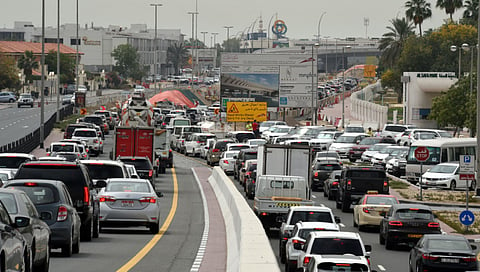Unending tailbacks on Al Safa Park interchangebother motorists
Traffic snarls around Al Safa Park frustrate motorists

Dubai: Al Safa Park interchange, where Al Hadiqa Street meets Al Wasl Road is not new to traffic jams. Over the last three years motorists have seen road diversions facilitating construction work related to the Dubai Canal project, leading to perennial congestion. But, as the canal work nears completion, it seems motorists have run out of patience.
Mohammad Ali steps out of his home near Spinneys on Al Wasl Road at 7am, heading to his office in Bur Dubai. But he has one major hurdle on his way — the traffic interchange near Al Safa Park. His entire trip to work takes him 40 minutes, but most of that time he spends crossing the traffic junction near Al Safa Park.
“It is getting worse every day and it doesn’t seem to end. We have been hearing that it will get over soon, but as a motorist facing this every day makes it difficult. Some days I just don’t have the energy to go through the traffic jam and I use Salik, but I can’t do that every day,” said Ali.
Motorists heading from Shaikh Zayed Road and Al Quoz feel they are most affected.
Martin Jennings, a marketing executive who works on Al Wasl Road, said traffic heading from Shaikh Zayed Road towards Hadiqa Street and Al Wasl Road is worst affected, particularly between 8am and 10am.
“The tailback runs as far back as the bowling centre sometimes and on Shaikh Zayed Road the tailback extends before interchange two during morning peak hours. The Roads and Transport Authority (RTA) has to solve the problem sooner than later,” said Jennings, who is a long-time resident of Dubai.
Another motorist, Sandy Clarkson, who works in the cosmetic industry, said the morning peak hour around Al Safa Park is like a nightmare for her.
“For around 15 to 20 minutes I am stuck in the 500 metre stretch between Shaikh Zayed Road interchange two to the Al Safa Park interchange. It becomes really frustrating sometimes and I hope it will be over soon,” said Clarkson.
The situation doesn’t change much in the afternoon or during evening peak hours.
“Going out for lunch is a pain. We used to have such a lovely lunch time before but since the canal work has begun I prefer to get the food delivered in office. Once in a while if we step out we spend 30 minutes for what should be a 10-minute drive,” said Amal Mustafa, a beautician.
In the evening motorists heading towards Abu Dhabi on Al Wasl Road suffer heavy congestion.
“Heading back home, I don’t have a choice other than getting stuck in traffic as I have exhausted all the alternatives. I know that the traffic is affected by canal works but as a motorist it is frustrating when you are few metres away from the traffic light but have to wait for ages to cross it,” said Mustafa, whose office is located on Al Wasl Road.
The RTA has maintained the same number of lanes on all the roads where work is in progress, including Shaikh Zayed Road, Al Wasl Road, Jumeirah Road, Al Athar Street and Al Hadiqa Street, but traffic continues to be affected due to road works.
According to RTA, completion of a major flyover on Al Wasl Road by the end of May will help ease traffic in the area and it will open to traffic in early June.
Ninety per cent of work on the bridge has been completed and it is expected to open for traffic by early June, helping reduce traffic congestion in the area.
The RTA recently opened a bridge connecting Al Athar Street to Al Hadiqa Street, which has improved traffic flow from one direction.
The Dubai Water Canal project is expected to be ready by the end of this year, with 80 per cent of the work already completed.
In January this year, an eight-lane bridge on Shaikh Zayed Road opened for traffic. Work is currently in progress on another eight-lane bridge for traffic heading south, which is expected to be ready by August.
Work on the Jumeirah Road has also reached up to 50 per cent and the bridge is expected to open by the end of July.
All three flyovers on Shaikh Zayed Road, Al Wasl Road and Jumeirah Road rise eight metres above the water canal, enabling the passage of boats below.
Construction work also includes bridges leading to the proposed peninsula to the south of Jumeirah Park, and the shifting of utility lines underneath the canal as well as laying alternative conduits below the canal bed to cater to anticipated future requirements.
The drilling work of the 3.2km water canal is expected to be completed in September.



